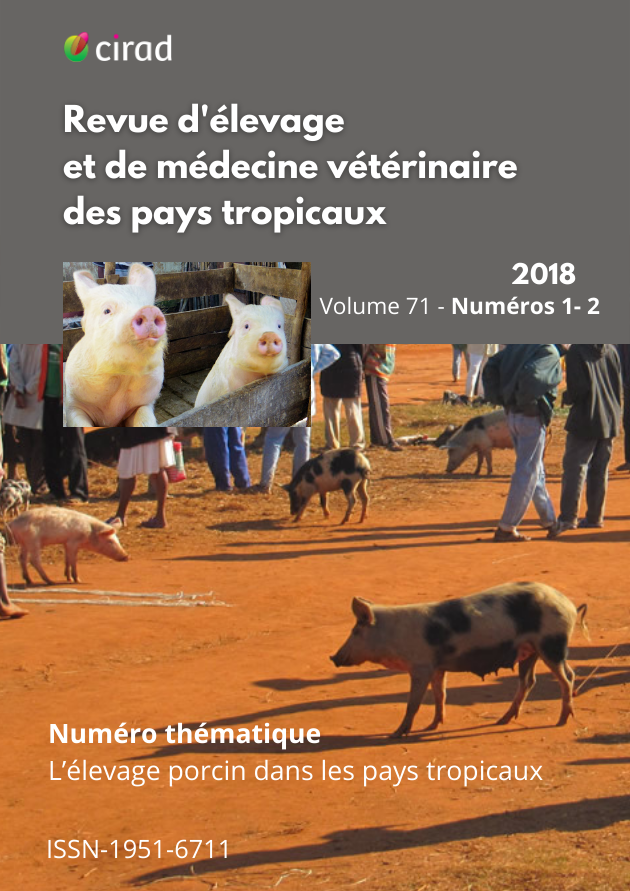Editorial - Pig production in tropical countries
DOI:
https://doi.org/10.19182/remvt.31682Keywords
Pigs, Swine, tropical countriesAbstract
Pigs account for about 35% of global meat production, on par with poultry (FAOSTAT, 2019). In sub-Saharan Africa, this proportion is much lower because of a strong tradition of bovine production and religious bans on pork consumption in large parts of the area. However, it represents 11.9% of the meat production of the region and its growth was 50% between 2007 and 2017. In areas where pig farming is practiced, it plays an important social and economic role when it is practiced on a small scale, often combined with other agricultural activities.
However, pig production faces many health issues (African swine fever, zoonoses), technical issues (genetics, feed) and social issues (acceptability of farms near residential areas). Faced with these challenges, many research teams are mobilized in the various producing countries. However, researchers are often isolated and struggle to make their works known to the scientific community and to integrate international scientific networks.
This thematic issue compiles thirteen original articles and reviews on pork farming in the tropics. Socioeconomic issues are addressed through examples of production subsectors in Africa but also in Vietnam or the Caribbean. The works show the difficulties of these subsectors, which are subject to numerous constraints. Often suburban, pig production must be discreet and in particular minimize its nuisance. These conditions make it difficult to structure and professionalize it in a way that would draw greater support from the authorities and a reduction in zoonotic risks. Livestock systems must also adapt to changing contexts where their industrialization disrupts their technical and economic functioning and challenges their role in traditional systems based on agriculture-livestock integration.
At the technical level, feed remains the main constraint for producers and the main cost of production in the contexts studied. Suggestions for the use of local resources (cakes of rubber kernels or cashew cakes, sweet potatoes) are proposed to reduce the incorporation of more expensive ingredients. Feeding practices around weaning can also improve animal start-up and subsequent performance. Finally, genetic choices are discussed, either to compare the performance of local or improved pigs, or to promote local breeds with heritage value.
Health issues remain a major concern. In Africa, African swine fever remains a constant threat; moreover, the diseases are numerous and strongly impact production. The characteristics of production and marketing systems increase the risk of contamination and make prevention policies difficult. However, there is a major health challenge for the pig production subsectors because, beyond the impact on production, zoonoses, but also the spread of antibiotic-resistant microbial strains, are a priority public health issue.
Keeping research moving forward, sharing results, building national, regional and international networks, these are efforts to be pursued. Through this thematic issue, the Journal continues its work to promote the most significant results obtained by researchers working in sometimes difficult material and partnership conditions. We can already announce that other articles, in addition to this thematic issue, will be published in future issues of the Journal to maintain our commitment to the promotion of swine research in the Souths.
Downloads
Downloads
-
Abstract1849
-
PDF (Français)557
Received
Published
How to Cite
Issue
Section
Categories
License
© V.Porphyre et al., hosted by CIRAD 2019

This work is licensed under a Creative Commons Attribution 4.0 International License.






